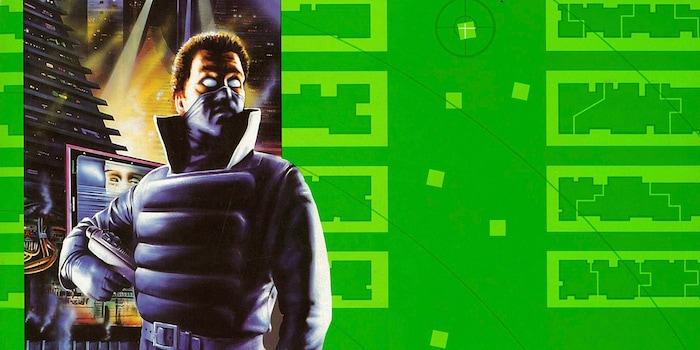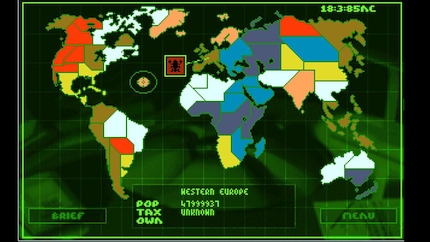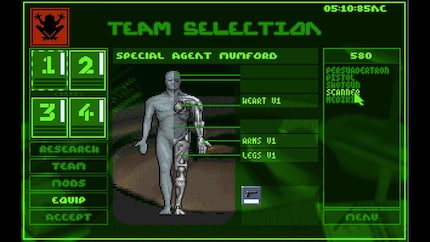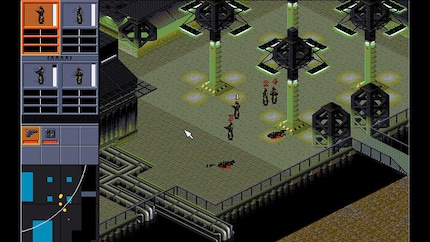
Background information
Playing "Pompeii: The Legacy": lots of "Anno", little new
by Debora Pape

In 2096, there are no more nations. The whole world belongs to large corporations. You control one of them and try to take over the world with a team of cyborgs. In 1993, "Syndicate" offered a gloomy glimpse into the future and revolutionary gameplay.
It was the blatant box that persuaded me to buy "Syndicate" as an 11-year-old. On it you can see: A mysterious agent with white eyes and a bulletproof vest in front of a big city background. I had no idea that I was buying an almost groundbreaking classic. The story of "Syndicate" goes hand in hand with the story of "EA".

Back then, Electronic Arts was still one of the good guys. The company was primarily a publisher and published games from independent studios, including Bullfrog. Peter Molyneux's studio had invented the god simulation genre with "Populus" and would later produce two more major titles with the amusement park simulation "Theme Park" and the 3D game "Magic Carpet" before being acquired by EA. Even after the takeover by today's entertainment giant, Molyneux and Bullfrog still had a few good games on the go, such as "Dungeon Keeper", which turned the role-playing game concept on its head. It was to be Molyneux's last game at "EA".
The company even banned him from the offices for fear that he would hire other employees for new projects, as the magazine "Retrogamer" wrote in an article about the classic. Four years later, however, it was over: in 2001, "Bullfrog" was integrated into the "EA UK" studio. This was to be a harbinger of what "EA" is today: a multinational, stock market-listed conglomerate that is primarily concerned with profits. Which brings me back to "Syndicate", because you work for such a corporation in this game...

First you get to name your corporation and customise it with a nice logo, then it's straight down to business: you equip four agents with weapons and body enhancements. If you strengthen the legs, for example, your agent will run faster, if you strengthen the arms of your agent, she can carry more weapons and equipment and a few new eyes enable more precise aiming. The enhancements can also be improved thanks to research and development. You have to decide whether you want to develop weapons or upgrades. You can't do both at the same time.
Once you have equipped your agents, it's time for the mission. On an isometric map, you have to sabotage other companies in cities, assassinate other agents or bring researchers to us through mind control. You control the agents with the mouse. If you need extra power, your agents can be pumped full of drugs. The ladies and gentlemen will then run faster or have better aim. But beware: over time, they develop a tolerance to the drugs. You can even drive cars. This made "Syndicate" something of a harbinger for "GTA", which was released four years later. After a successful mission, the conquered land belongs to your company. You can then levy taxes to finance new research and new weapons. If the taxes are too high, the inhabitants rebel and you have to play another mission in the country, which in turn costs money.
"Syndicate" was extremely bloody. Whilst you hardly cause a stir with a concealed weapon, you can cause a gruesome bloodbath with your arsenal of weapons. Cars and even trains explode, civilians lie on the ground in pools of blood. In terms of violence, "Syndicate" has also set a good example for the "GTA" series. It's the little details that really impress: the dynamic soundtrack, which becomes increasingly hectic the closer you get to your destination. Or the lively cities with pedestrian overpasses, parks and railway stations.

The game gripped me then and now. Although the story is "only" told through mission descriptions, the cutscenes are always the same and the missions are also similar. The controls are a bit strange at times and your agents like to get stuck on the corner of a house. Sure. The game has been around for a few years now. But it never gets old using your "persuasion ray" to lure a whole army of civilians, police officers and even enemy agents to your side and walk through cyberpunk Nazareth like Jesus with his disciples. Even though the sequel "Syndicate Wars" brought the game into the 3D era and improved it in certain ways, I somehow like the original more because I can lead my company from nothing to world domination.
When I flew the family nest over 15 years ago, I suddenly had to cook for myself. But it wasn’t long until this necessity became a virtue. Today, rattling those pots and pans is a fundamental part of my life. I’m a true foodie and devour everything from junk food to star-awarded cuisine. Literally. I eat way too fast.
Interesting facts about products, behind-the-scenes looks at manufacturers and deep-dives on interesting people.
Show all
Background information
by Debora Pape

Background information
by Kevin Hofer

Background information
by Debora Pape